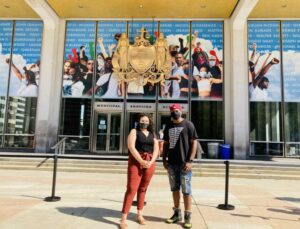
Growing up near Philadelphia in Elkins Park, Kali Silverman loved public art, especially murals. She enjoyed what they brought to the city.
They honored Philadelphia, she thought. They brought to light its significance.
“There’s so much in this city and so many stories that need to be told. Public art is accessible to everyone,” Silverman explained.
The 34-year-old also grew to believe there was a political significance to public art. It could give people agency. It could make them realize that the sidewalk, street and walls were “there for us to use and make better,” Silverman said.
“The city is built around us. We’re not taught to have any agency of the space around us,” she added. “That’s the first place we can start and build community engagement.”
It is this belief that motivates Silverman in her work for Mural Arts Philadelphia, which helps artists put up murals in the city. But for the girl who grew up at Congregation Kol Ami with her family, her role as a senior project manager is also an expression of her Jewish values.
The Philadelphia resident’s mother was a nutritional educator who organized after-school programs. Her father was an infectious disease physician who worked with patients with HIV and AIDS. They raised her in a Reform Jewish household and synagogue around the denomination’s core value: tikkun olam, repairing the world.
But it was her experience as a camper at Habonim Dror Camp Galil, in Ottsville, that taught her to do more than just try to help. The camp has “socialist Zionist” values, according to Silverman. Campers were expected to plan programs, not just participate in them.
Silverman started there in 2000 when she was 11.
“We had so much agency from a young age,” she said.
From 2007-2010, Silverman worked as a counselor at Galil. Then, from 2010-2012, she became its director, a role that required her to hire and train staff. And for three years after that, she served as the executive director of Habonim Dror North America. The camp alum advised camp directors, managed staff seminars and built the organization’s website and social media profiles.
Silverman moved from that position to a role as assistant program manager for the Foundation for Jewish Camp, a nonprofit that works with Jewish summer camps throughout North America. She had reached the continental level of the camping world. She also felt like she was ready to expand her service work beyond the Jewish camping community.
Driven by the Zionist part of Galil’s “socialist Zionist” values, she made aliyah in 2015. She explored opportunities in Israel’s tech sector. But she ended up with BINA: The Jewish Movement for Social Change. Her role with the Tel Aviv-based organization was to help organize programs that placed young people “with organizations rooted in Jewish values and human rights for all.”
“It was a great opportunity, and I had a lot more experience that made me very qualified for the job,” she said. “I rode my bike to work every day.”

(Courtesy of Kali Silverman)
While there, she also started a master’s program in international community development at The Hebrew University of Jerusalem. In a class about cities and urban planning, Silverman learned the term placemaking, which refers to residents helping to build their own neighborhoods.
After Silverman graduated in 2019, she moved back to the Philadelphia area to be close to her family. She also remembered the lesson of placemaking and got a job as a project manager at Mural Arts.
Over the past four years at Mural Arts, Silverman has helped put up murals showing Philadelphia during the George Floyd protests of 2020, honoring the 50th anniversary of hip-hop and welcoming residents to FDR Park in South Philadelphia.
“Our goal is to amplify their voices, amplify their vision and their artwork,” she said of the artists.
Taking ownership of public space also reminds her of some of her early lessons as a camper. Silverman had to clean bathrooms and take out the trash.
“It’s understanding my responsibility for this community, this space,” she said. “The more people feel responsibility, the less littering we’ll have and vandalism.”
Tikkun olam is about personal and collective responsibility, she explained.
“Tikkun olam is the basis of everything. Especially camp and our Reform congregation,” Silverman continued.






